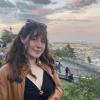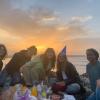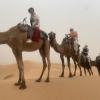In the quiet hush of the old medina at 6:45 am on a Thursday, I huddled with a group of twelve other students by the side of the Kasbah des Oudayas, waiting for a tour bus that would become our personal tomb for the next three days around the High Atlas Mountains.
The sun was just barely streaking the sky opposite of the Atlantic ocean billowing out our window when we started our journey inland, towards the mountainous Ifrane National Forest. Our first stop was at a cafe for breakfast, a stop flush with cats mewing at us for bites of melwi. We continued our journey to Le Maison de Cedarie, a national park’s museum about the cedar trees native to the region. The museum was fascinating of course, but the monkeys hanging out outside the building truly stole the show. We then walked into the forest for lunch under the trees (and umbrellas, as it had started raining).
Luckily, we were warmed by the campfire and put our hands to work cutting up vegetables for salad and tagine. With our combined effort, lunch was ready in around an hour, and it was as if the rain made it all the more delicious. Drenched as I was, my core was made warm from the heat of the food and good company.
We made our way to the small town of Ben Smim, where we found ourselves in a small one-room school, walls painted with flowers, rainbows, and surprising American iconography such as Mickey Mouse and SpongeBob. The men of the village had brought out tambourine-like drums and put on a delightful show for our group and the students, who ranged from age 5–10. After the dancing and chanting, we painted pots with the school kids and planted trees within them. This, of course, quickly devolved into an arm wrestling competition with the older boys of the village. I, of course, beat the twelve-year-olds without issue. I can’t say the same about everyone else in my group…
As night started to approach, we went our separate ways with various families of the village, who hosted us for dinner and a warm sleep by their furnaces. As Friday approached, the smell of couscous was on the horizon. We loaded back into our tour bus, before an abrupt stop at the start of a looming cedar forest.
“We’ll be starting on a three-hour hike,” our guide announced. Oh. I had assumed it was more of a walk to the nomadic Amazigh village, and left my water bottle at the house in the town. Too late now!
The walk was treacherous, with less of a trail and more a splattering of rocks and trees. My ankles were aching halfway through, but the foggy morning left a gorgeous imprint on the deep green meadows, reminding me surprisingly of my home in the Pacific Northwest. By the time we at last reached the nomadic village, I was about ready to collapse. Luckily, Friday in Morocco is couscous day, and there was a warm meal waiting for us inside. As we ate the chicken and vegetables atop a platter of brilliantly cooked couscous, our guide explained the history of our nomadic hosts. Only people whose grandparents had once been nomads in the land of the Ifrane National Forest were still allowed to live there, though they were forbidden from living in permanent structures. There had been a drought several years before, so the family had settled in the valley alongside several other nomadic families so that they had easier access to food and water, and their animals could graze easily. Still, their home was made of temporary materials to stay in line with Moroccan law.
After lunch, I slipped loosely into sleep, the taste of mint tea heavy on my tongue. I was awakened by a gentle voice saying, “Hey, we’re riding donkeys.”
My weariness could not hold me down, nor the starting rain, as I hopped on the donkey's back and took it around the area, past the herds of sheep and prairie dogs. Stones dotted the pathways, covered in rich moss and flocking birds. This world felt untouched. As I returned to the nomadic tent, I saw the owner walking past with a lamb covered in blood. At first, I was met with shock, assuming it was dead, until the four-year-old daughter ran up and started petting it. I was then told it was newly born, and within minutes the young kid was walking around and playing with the young girl. Despite the mist and dewey skies, the scene held a certain yearning to it, like an old memory, a scene from a book set years in the past.
We hiked back to the tour bus soon after, warming ourselves in our host houses back in Ben Smim. I napped next to the furnace, deeply, before returning to the town for our evening activities. The children we’d been with the other day came to meet us and we taught them red light, green light as best we could considering the language barrier before meeting our guide.
We made our way to a field overlooking a small lake and the teeming mountains. The sun was starting to set, and we set up a bonfire, as well as a speaker to play music. We danced, we laughed, we roasted marshmallows, and watched the sun sink behind the mountains and the clouds that hid them. Tomorrow, we’d make our way to Rabat, to the warm coast and city streets. But for that moment, the darkness was as thick as mud, and the only sounds were the crackling of the fire and the slow whispering of the monkeys, donkeys, and sheep who’d greeted us in the light.



Zoe Carver
Zoe Carver is a second-year student of International Affairs and Peace Studies at the George Washington University, minoring in French and Creative Writing. She is originally from Portland, Oregon and is apart of GW's Literary Magazine, Model UN team, and Student Climate Coalition. She just finished a positon interning in the United States Senate, and has a deep love for crocheting.









